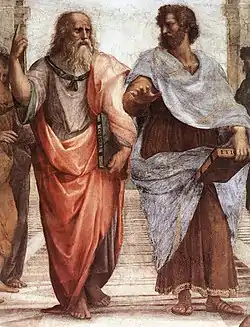History of theology
The history of theology has manifestations in many different cultures and religious traditions.
Terminology and connotations

Plato used the Greek word theologia (θεολογία) with the meaning "discourse on god" around 380 BCE in Republic, Book ii, Ch. 18 (379a).[1] Aristotle (384–322 BCE) divided theoretical philosophy into mathematike, physike and theologike, with the last corresponding roughly to metaphysics, which, for Aristotle, included discourse on the nature of the divine.[2]
In patristic Greek Christian sources, theologia could refer narrowly to devout and inspired knowledge of, and teaching about, the essential nature of God.[3]
The Latin author Boethius, writing in the early 6th century, used theologia to denote a subdivision of philosophy as a subject of academic study, dealing with the motionless, incorporeal reality (as opposed to physica, which deals with corporeal, moving realities).[4] Boethius' definition influenced medieval Latin usage.[5]
In the Renaissance, especially with Florentine Platonist apologists of Dante's poetics, the distinction between "poetic theology" ( theologia poetica) and "revealed" or Biblical theology served as a steppingstone for a revival of philosophy as independent of theological authority.
It is in this last sense - theology as an academic discipline involving the basis of rational study of Christian teaching - that the term passed into English in the fourteenth century,[6] although it could also be used in the narrower sense found in Boethius and the Greek patristic authors, to mean rational study of the essential nature of God – a discourse now sometimes called theology proper.[7]
From the 17th century onwards, it also became possible to use the term "theology" to refer to study of religious ideas and teachings that are not specifically Christian (e.g., in the term natural theology which denoted theology based on reasoning from natural facts independent of specifically Christian revelation[8]) or that are specific to another religion.
"Theology" can also now be used in a derived sense to mean "a system of theoretical principles; an (impractical or rigid) ideology".[9]
Theological development
Indian theology
Christian theology
Christian theology, in scholastics of the Middle Age regarded as "the queen of sciences"[10] first developed on the bases of Judaism and of Greek thought. Initially concerned with shaping and defining the new faith of the followers of Jesus of Nazareth, theological thinkers moved into issues of establishing church government and of preserving doctrinal unity ("orthodoxy") by identifying and condemning heresies. The definitive establishment of a canon of scripture became important; and as Christianity moved into a role as a state religion in the 4th century (in Armenia, in the Roman Empire, and in Ethiopia), the working out of relationships with secular authority became important.
The 16th-century Protestant reformation, in the spirit of Renaissance humanism, paid great attention to the study of biblical text, accompanied by outbursts of popular theology in personal religious fervor[11] and by the refinement of rigorous systematic theology. The resulting tradition of multiple Christian sects served as a background to revivals in the 18th and 19th centuries, when some of the old "heresies" (such as Arianism and other non-Trinitarian beliefs), once apparently stamped out by the earlier ecclesiastical authorities, received more attention and sometimes became elements in further schisms.
Recent Christian theological movements include Liberation theology, liberal theology, and fundamentalism.
Islamic theology
See also
References
- Liddell and Scott's Greek-English Lexicon
- Aristotle, Metaphysics, Book Epsilon. Archived 16 February 2008 at the Wayback Machine
- Gregory of Nazianzus uses the word in this sense in his fourth-century Theological Orations Archived 2006-08-07 at the Wayback Machine; after his death, he was called "the Theologian" at the 451 Council of Chalcedon and thereafter in Eastern Orthodoxy—either because his Orations were seen as crucial examples of this kind of theology, or in the sense that he was (like the author of the Book of Revelation) seen as one who was an inspired preacher of the words of God. (It is unlikely to mean, as claimed in the Nicene and Post-Nicene Fathers Archived 2006-07-16 at the Wayback Machine introduction to his Theological Orations, that he was a defender of the divinity of Christ the Word.) See John McGukin, Saint Gregory of Nazianzus: An Intellectual Biography (Crestwood, NY: St. Vladimir's Seminary Press, 2001), p.278.
- "Boethius, On the Holy Trinity" (PDF). Retrieved 2012-11-11.
- G.R. Evans, Old Arts and New Theology: The Beginnings of Theology as an Academic Discipline (Oxford: Clarendon Press, 1980), 31–32.
- See the 'note' in the Oxford English Dictionary entry for 'theology'.
- See, for example, Charles Hodge, Systematic Theology, vol. 1, part 1 (1871).
- Oxford English Dictionary, sense 1
- Oxford English Dictionary, 1989 edition, 'Theology' sense 1(d), and 'Theological' sense A.3; the earliest reference given is from the 1959 Times Literary Supplement 5 June 329/4: "The 'theological' approach to Soviet Marxism ... proves in the long run unsatisfactory."
-
Zakai, Avihu (22 July 2010). "Regina Scientiarum - Theology as the 'Queen of Sciences'". Jonathan Edwards's Philosophy of Nature: The Re-enchantment of the World in the Age of Scientific Reasoning. T & T Clark theology. London: A&C Black (published 2010). p. 56. ISBN 9780567226501. Retrieved 19 July 2021.
[...] in the medieval scholastic world, theology was defined as the "Queen of Sciences" [...].
-
Whitney, James Pounder (1907). The History of the Reformation (reprint ed.). S.P.C.K. (published 1958). p. 36. Retrieved 19 July 2021.
In the Middle Ages, as at all times, popular theology had on many points outrun authorised theology: the fifteenth century was overladen both in bold speculations and practical details by the results of past generations.
External links
| Library resources about History of theology |
- "Theology" on Encyclopædia Britannica
- Chattopadhyay, Subhasis. "Reflections on Hindu Theology" in Prabuddha Bharata or Awakened India 120(12):664-672 (2014). ISSN 0032-6178. Edited by Swami Narasimhananda.
 Theology public domain audiobook at LibriVox
Theology public domain audiobook at LibriVox